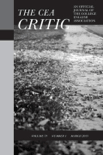
CEA CRITIC
Scope & Guideline
Challenging norms, enriching perspectives.
Introduction
Aims and Scopes
- Interdisciplinary Literary Analysis:
The journal emphasizes the exploration of literature through various lenses, including historical, cultural, and philosophical contexts, encouraging scholars to draw connections between texts and broader societal themes. - Pedagogical Innovations in English Studies:
A significant focus is placed on teaching methodologies and pedagogical practices, particularly in the composition classroom, highlighting strategies that promote inclusivity and critical engagement among students. - Cultural and Historical Contextualization:
The CEA Critic frequently examines the relationship between literature and its socio-political context, exploring how historical events and cultural movements shape literary production and reception. - Exploration of Marginalized Voices:
The journal prioritizes the examination of underrepresented and marginalized voices in literature, aiming to amplify diverse narratives and challenge dominant literary canons. - Theoretical Frameworks in Literary Criticism:
The integration of various theoretical frameworks, such as posthumanism, trauma studies, and feminist theory, is a hallmark of the journal, facilitating nuanced discussions on contemporary literary issues.
Trending and Emerging
- Cultural Trauma and Memory Studies:
A growing interest in cultural trauma and memory studies is evident, with scholars analyzing how literature reflects and shapes collective memories of trauma, particularly in relation to marginalized communities. - Ecocriticism and Environmental Literature:
There is an increasing focus on ecocriticism and the representation of ecological themes in literature, reflecting a broader societal awareness of environmental issues and climate change. - Digital Humanities and Multimodal Approaches:
The integration of digital humanities and multimodal approaches in literary studies is on the rise, with scholars exploring how technology influences literature and pedagogy. - Race, Identity, and Intersectionality:
Emerging discussions around race, identity, and intersectionality are prevalent, as the journal seeks to engage with contemporary debates on how these factors influence literary production and interpretation. - Innovative Pedagogical Practices:
The journal is increasingly publishing works that explore innovative pedagogical practices, particularly those that address inclusivity, accessibility, and the impact of technology on teaching in the humanities.
Declining or Waning
- Traditional Literary Canon:
There has been a noticeable decline in papers focused solely on the traditional literary canon, as the journal increasingly prioritizes diverse and contemporary voices over classical texts. - Purely Textual Analysis:
The emphasis on purely textual analysis without contextual or interdisciplinary frameworks appears to be waning, with more scholars seeking to integrate cultural, historical, and pedagogical perspectives. - Static Pedagogical Approaches:
Traditional, static approaches to teaching literature and composition are becoming less frequent, as the journal favors innovative, dynamic, and inclusive pedagogical strategies that reflect current educational needs. - Isolation of Literary Genres:
The isolation of specific literary genres for analysis is declining, as there is a growing trend towards exploring cross-genre influences and hybrid forms in literature. - Historical Revisionism in Isolation:
While historical revisionism remains a topic of interest, the approach of examining it in isolation from contemporary issues is becoming less prevalent, with scholars increasingly connecting past narratives to present-day concerns.
Similar Journals

RAMUS-CRITICAL STUDIES IN GREEK AND ROMAN LITERATURE
Celebrating the Enduring Legacy of Classical LiteratureRAMUS: Critical Studies in Greek and Roman Literature, published by Cambridge University Press, stands as a premier journal dedicated to the exploration and analysis of classical literary texts. Established in 2002, this journal has garnered recognition in its field, achieving a Q1 category ranking in both Classics and Literature and Literary Theory for 2023, which reflects its commitment to scholarly excellence. With an impressive Scopus ranking, where it places in the 76th percentile for Literature and Literary Theory and the 70th percentile for Classics, RAMUS is a critical resource for researchers, professionals, and students engaged in the study of ancient texts and their lasting impact on contemporary literature. Although currently not an open-access journal, it offers a wealth of peer-reviewed articles, reviews, and critical essays that enrich understanding and foster discussions in the realms of Greek and Roman literary traditions. This journal not only serves as an academic platform but also contributes to the ongoing dialogue on the relevance of classical literature in today's cultural and literary discourse.

NEUE RUNDSCHAU
Cultivating Insights into Artistic ExpressionNEUE RUNDSCHAU is a prominent journal published by S Fischer Verlag GmbH, specializing in the fields of literature and literary theory, as well as visual arts and performing arts. With its roots tracing back to its inception in 1969, this journal has evolved significantly, providing a platform for critical discourse and innovative scholarship in the arts and humanities. Although it experienced coverage changes, the journal remains a vital resource for researchers and academics, contributing to the rich dialogue surrounding cultural studies and artistic expression. Furthermore, while it is not available through open access, NEUE RUNDSCHAU offers essential insights into contemporary literary trends and artistic movements, ensuring its relevance and importance within the academic sphere. With Scopus rankings including a position in the 16th percentile for literature and literary theory, and a 10th percentile placement in cultural studies, the journal embodies a commitment to quality scholarly contributions, making it an invaluable asset for students, professionals, and researchers alike.

CANADIAN LITERATURE
Fostering Interdisciplinary Dialogues in Canadian LiteratureCanadian Literature is a distinguished journal published by the University of British Columbia, dedicated to exploring the rich landscape of Canadian literary studies. With its strong impact in the field, evidenced by its Scopus ranking of #197 out of 845 in the category of Arts and Humanities, specifically in Literature and Literary Theory, this journal serves as a pivotal platform for both emerging and established scholars. Covering a wide range of topics related to Canadian literature and culture, it aims to foster an interdisciplinary dialogue that reflects the diverse voices and narratives shaping the literary scene in Canada. Though the journal transitioned its coverage in Scopus after 2019, it continues to provide valuable insights and critical discourse in its publications. Researchers, students, and professionals looking to deepen their understanding of Canadian literature will find Canadian Literature an essential resource for contemporary scholarship.
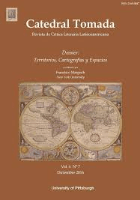
Catedral Tomada-Revista de Critica Literaria Latinoamericana-Journal of Latin American Literary Criticism
Fostering Dialogue in Latin American Literary DiscourseCatedral Tomada - Revista de Crítica Literaria Latinoamericana is a pioneering journal dedicated to the exploration and critique of Latin American literature and its broader cultural implications. Published by the University of Pittsburgh's Library System, this Open Access journal has been instrumental since its launch in 2013 in making scholarly discussions accessible to a wider audience. With an ISSN of 2169-0847, the journal serves as a vital platform for researchers, professionals, and students interested in Literature and Literary Theory, Cultural Studies, and Linguistics and Language. Its esteemed ranking places it in Quartile 1 for Literature and Literary Theory and Quartile 2 for the other categories, underlining its commitment to high-quality academic discourse. Converging insights through a quarterly publication schedule from 2019 to 2024, Catedral Tomada aims to foster a rich dialogue on Latin American literary criticism, encouraging innovative perspectives and diverse voices within the field.
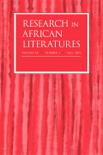
RESEARCH IN AFRICAN LITERATURES
Cultivating Scholarly Excellence in African NarrativesRESEARCH IN AFRICAN LITERATURES is a prestigious peer-reviewed journal published by Indiana University Press, dedicated to the critical exploration of African literary traditions, cultures, and texts. With an ISSN of 0034-5210 and an E-ISSN of 1527-2044, this journal stands out in the field of literature and literary theory, currently ranking in the 80th percentile of its category according to Scopus, making it a significant platform for scholars and researchers alike. Since its establishment, the journal has evolved through converged volumes from 2002 to 2024, consistently fostering innovative discourse and interdisciplinary approaches that illuminate the complexities of African narratives. Although it does not offer open access, the journal is integral for anyone engaged in African studies, providing critical insights that are essential for understanding the broader implications of literature within diverse cultural contexts. The journal's commitment to high standards of scholarship is reflected in its Q3 quartile ranking and its influential contribution to contemporary literary dialogue.
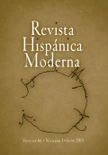
Revista Hispanica Moderna
Diving into the Richness of Hispanic StudiesRevista Hispanica Moderna, published by University of Pennsylvania Press, is a scholarly journal dedicated to exploring the rich tapestry of Hispanic cultural, historical, and literary studies. With an ISSN of 0034-9593 and an E-ISSN of 1944-6446, this esteemed publication operates within the United States, ensuring a broad international reach. While it currently does not offer Open Access, the journal provides significant insights across diverse fields, categorized as Q4 in Cultural Studies, History, and Literature and Literary Theory as per the 2023 standards. Although the journal ranks in the lower quartiles of its fields, its systematic approach to modern Hispanic studies offers valuable opportunities for gaining perspectives that are often underrepresented. Researchers, professionals, and students are encouraged to engage with its content as it navigates the complexities of cultural identities and historical narratives from 2019 to 2024 and beyond, making important contributions to the ongoing discourse in the humanities.

Wenshan Review of Literature and Culture
Cultivating Interdisciplinary Insights in CultureWenshan Review of Literature and Culture, an esteemed journal published by NATIONAL CHENGCHI UNIVERSITY in Taiwan, serves as a vital platform for interdisciplinary scholarship in the realms of literature and cultural studies. With its ISSN 2077-1282 and E-ISSN 2077-1290, this journal aims to engage researchers, professionals, and students alike in critical discourse while significantly contributing to the academic community's understanding of contemporary literary and cultural phenomena. As of 2023, it holds a respectable position in Q4 for Cultural Studies and Q3 for Literature and Literary Theory, reflecting its growing influence within these disciplines. Although it operates under a non-open access model, the journal's commitment to quality research is evident in its rigorous peer-review process and dedication to publishing innovative ideas. By converging diverse perspectives from 2016 through 2024, the Wenshan Review not only fosters a deeper understanding of its subjects but also acts as a bridge connecting scholars from various backgrounds to share their insights more broadly and effectively.
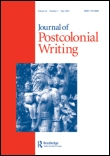
Journal of Postcolonial Writing
Unveiling Diverse Voices in Literary DiscourseJournal of Postcolonial Writing, published by ROUTLEDGE JOURNALS, TAYLOR & FRANCIS LTD, stands as a pivotal platform in the field of postcolonial studies and literary theory. Since its inception in 2005, this esteemed journal has cultivated a dedicated space for scholarly discourse, focusing on the complex interplay between literature, culture, and colonial histories. With an impressive Q1 ranking in the 2023 Literature and Literary Theory category and a notable Scopus rank of 97/1106, the journal occupies a vital place in the academic landscape, achieving a significant percentile of the 91st. Researchers and students alike will find the journal’s commitment to exploring diverse narratives and critical frameworks invaluable, making it an essential resource for those engaged in contemporary literary scholarship. Although not open access, readers can access high-quality research that contributes to meaningful conversations within the discipline, supporting the journal’s objective to foster interdisciplinary collaboration and innovation.

TWENTIETH CENTURY LITERATURE
Fostering Critical Dialogue in Literary StudiesTWENTIETH CENTURY LITERATURE is a renowned journal published by Hofstra University Press, dedicated to the exploration and analysis of literature and literary theory from the twentieth century. With a focus on both established and emerging voices in the field, this journal serves as an essential resource for researchers, professionals, and students who seek to deepen their understanding of significant literary movements and trends. The journal holds an impressive Q2 category ranking in Literature and Literary Theory as of 2023, showcasing its impact and relevance in the academic community. Though not an open access journal, it provides valuable insights and scholarly discussions that contribute to ongoing debates in literature studies. Covering a converged period from 2002 to 2014 and continuing from 2016 to 2024, TWENTIETH CENTURY LITERATURE positions itself as a pivotal platform for thought-provoking literature critique and scholarly inquiry, making it an indispensable addition to any academic library or personal collection.

TEXT & KRITIK
Fostering rigorous scholarship in literary criticism.TEXT & KRITIK, an esteemed academic journal published by EDITION TEXT KRITIK GMBH in Germany, serves as a critical platform for advancing scholarship in the fields of literature and literary theory. With an ISSN of 0040-5329, this publication aims to foster rigorous discourse and stimulate intellectual inquiry from 2009 to 2023, reflecting the evolving landscape of literary studies. Although categorized in the fourth quartile (Q4) in the 2023 measure of literature and literary theory, TEXT & KRITIK consistently engages with a diverse array of literary perspectives and methodologies, addressing both historical texts and contemporary literature. Researchers, professionals, and students alike are encouraged to explore this resource to deepen their understanding of critical texts and theoretical frameworks. While it does not currently operate on an open access model, its curated content remains a vital resource for anyone dedicated to exploring the nuances of literary analysis and criticism.